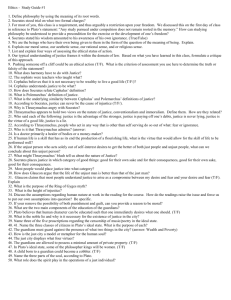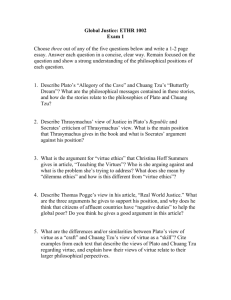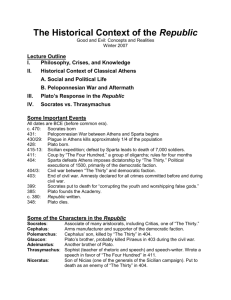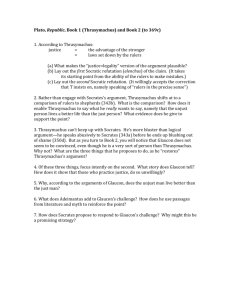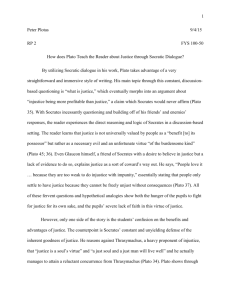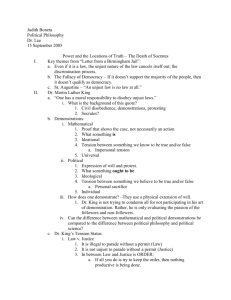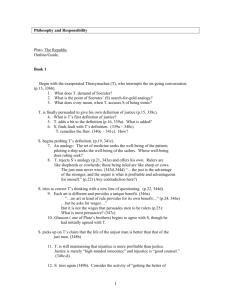Plato Republic Book I
advertisement
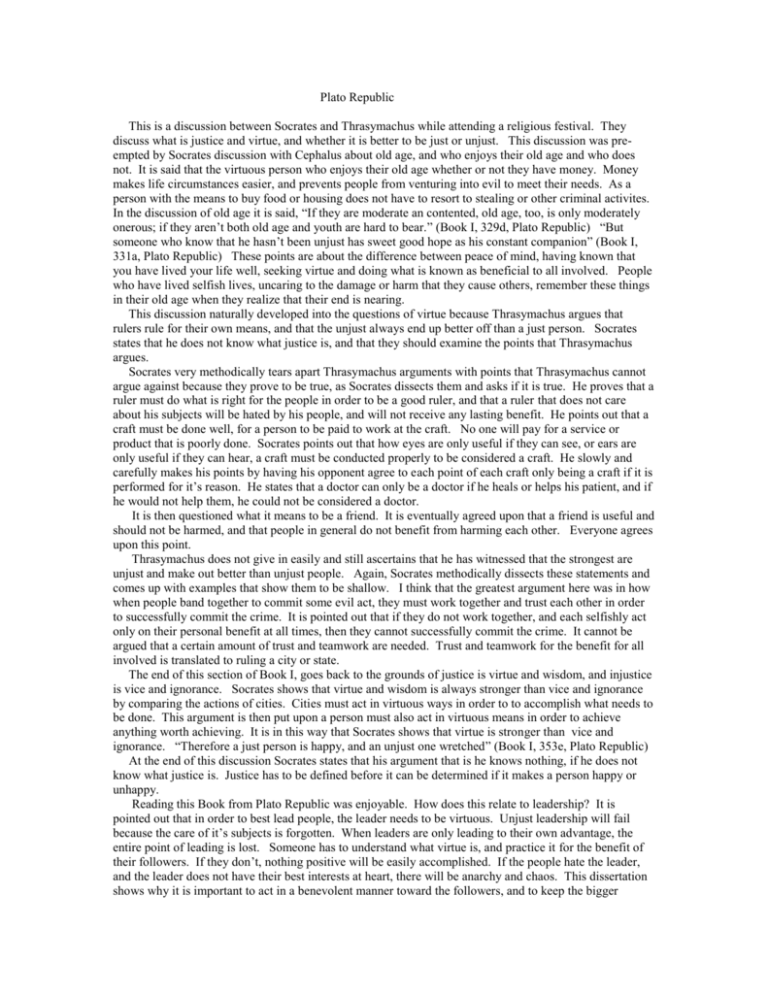
Plato Republic This is a discussion between Socrates and Thrasymachus while attending a religious festival. They discuss what is justice and virtue, and whether it is better to be just or unjust. This discussion was preempted by Socrates discussion with Cephalus about old age, and who enjoys their old age and who does not. It is said that the virtuous person who enjoys their old age whether or not they have money. Money makes life circumstances easier, and prevents people from venturing into evil to meet their needs. As a person with the means to buy food or housing does not have to resort to stealing or other criminal activites. In the discussion of old age it is said, “If they are moderate an contented, old age, too, is only moderately onerous; if they aren’t both old age and youth are hard to bear.” (Book I, 329d, Plato Republic) “But someone who know that he hasn’t been unjust has sweet good hope as his constant companion” (Book I, 331a, Plato Republic) These points are about the difference between peace of mind, having known that you have lived your life well, seeking virtue and doing what is known as beneficial to all involved. People who have lived selfish lives, uncaring to the damage or harm that they cause others, remember these things in their old age when they realize that their end is nearing. This discussion naturally developed into the questions of virtue because Thrasymachus argues that rulers rule for their own means, and that the unjust always end up better off than a just person. Socrates states that he does not know what justice is, and that they should examine the points that Thrasymachus argues. Socrates very methodically tears apart Thrasymachus arguments with points that Thrasymachus cannot argue against because they prove to be true, as Socrates dissects them and asks if it is true. He proves that a ruler must do what is right for the people in order to be a good ruler, and that a ruler that does not care about his subjects will be hated by his people, and will not receive any lasting benefit. He points out that a craft must be done well, for a person to be paid to work at the craft. No one will pay for a service or product that is poorly done. Socrates points out that how eyes are only useful if they can see, or ears are only useful if they can hear, a craft must be conducted properly to be considered a craft. He slowly and carefully makes his points by having his opponent agree to each point of each craft only being a craft if it is performed for it’s reason. He states that a doctor can only be a doctor if he heals or helps his patient, and if he would not help them, he could not be considered a doctor. It is then questioned what it means to be a friend. It is eventually agreed upon that a friend is useful and should not be harmed, and that people in general do not benefit from harming each other. Everyone agrees upon this point. Thrasymachus does not give in easily and still ascertains that he has witnessed that the strongest are unjust and make out better than unjust people. Again, Socrates methodically dissects these statements and comes up with examples that show them to be shallow. I think that the greatest argument here was in how when people band together to commit some evil act, they must work together and trust each other in order to successfully commit the crime. It is pointed out that if they do not work together, and each selfishly act only on their personal benefit at all times, then they cannot successfully commit the crime. It cannot be argued that a certain amount of trust and teamwork are needed. Trust and teamwork for the benefit for all involved is translated to ruling a city or state. The end of this section of Book I, goes back to the grounds of justice is virtue and wisdom, and injustice is vice and ignorance. Socrates shows that virtue and wisdom is always stronger than vice and ignorance by comparing the actions of cities. Cities must act in virtuous ways in order to to accomplish what needs to be done. This argument is then put upon a person must also act in virtuous means in order to achieve anything worth achieving. It is in this way that Socrates shows that virtue is stronger than vice and ignorance. “Therefore a just person is happy, and an unjust one wretched” (Book I, 353e, Plato Republic) At the end of this discussion Socrates states that his argument that is he knows nothing, if he does not know what justice is. Justice has to be defined before it can be determined if it makes a person happy or unhappy. Reading this Book from Plato Republic was enjoyable. How does this relate to leadership? It is pointed out that in order to best lead people, the leader needs to be virtuous. Unjust leadership will fail because the care of it’s subjects is forgotten. When leaders are only leading to their own advantage, the entire point of leading is lost. Someone has to understand what virtue is, and practice it for the benefit of their followers. If they don’t, nothing positive will be easily accomplished. If the people hate the leader, and the leader does not have their best interests at heart, there will be anarchy and chaos. This dissertation shows why it is important to act in a benevolent manner toward the followers, and to keep the bigger picture of the end goals in mind in order to accomplish them. As was stated in this argument, if a horse is injured and can’t run, it cannot function well as a horse. If a doctor injures his patient instead of healing him or her, then the doctor is not a doctor. Unjust strength may work for a short term outcome, but there will be long term effects, and a negative result in the long run.
